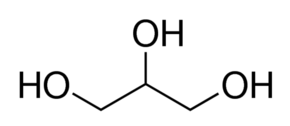HI! I’M ELEMENT AI.
Glycerine

Product Description
Glycerine, also known as glycerin or glycerol, is a versatile compound with numerous industrial applications.
Product:
Glycerine
CAS:
56-81-5
Synonym:
Glycerin; Glycerol; 1,2,3-Propanetriol; Glycyl alcohol
Structure:

Typical Characteristics
Appearance
Colorless liquid
Boiling point
290 °C
Density
1.2613 g/cm3
Flash Point
177 °C
Melting point
18 °C
Molecular Weight
92.09
Odor
Odorless
Purity
99.5 %
Refractive index
1.474
Uses, Applications & Markets
Key applications
get a quote



Glycerine used in many
industry applications
Glycerine, also known as glycerin or glycerol, is a versatile compound with numerous industrial applications. Here's a list of some of its uses:
- Moisturizer: Glycerine is widely used in skincare products, such as lotions, creams, and soaps, due to its humectant properties. It helps attract and retain moisture in the skin, keeping it hydrated, soft, and supple.
- Personal Care Products: It is used in various personal care products, including shampoos, conditioners, toothpaste, and mouthwash, as a moisturizing and emollient agent. Glycerine helps improve product texture, spreadability, and shelf life.
- Food and Beverage Industry: Glycerine is used as a sweetener, humectant, and solvent in the food and beverage industry. It is commonly found in processed foods, baked goods, confectionery, and beverages as a thickening agent, stabilizer, and preservative.
- Pharmaceuticals: Glycerine is used in pharmaceutical formulations as a solvent, sweetening agent, and lubricant. It is found in oral medications, cough syrups, and suppositories, providing moisture and improving palatability.
- Cosmetics: Glycerine is used in cosmetics and beauty products, such as makeup, hair care products, and perfumes, for its moisturizing and smoothing properties. It helps improve product texture, spreadability, and adherence to the skin and hair.
- Antifreeze and Coolants: Glycerine is used in antifreeze and coolant formulations for automotive and industrial applications. It serves as a non-toxic alternative to ethylene glycol, providing freeze protection and thermal stability in cooling systems.
- Humectant in Tobacco Products: Glycerine is added to tobacco products, such as cigarettes, cigars, and pipe tobacco, as a humectant to prevent drying and maintain moisture content. It helps improve the flavor, aroma, and burning characteristics of tobacco.
- Pharmaceutical Excipient: Glycerine is used as an excipient in pharmaceutical formulations to improve drug solubility, stability, and bioavailability. It is commonly found in oral suspensions, elixirs, and injectable medications.
- Textile Industry: Glycerine is used in the textile industry as a softening agent and lubricant for natural and synthetic fibers. It helps improve fabric flexibility, hand feel, and dye uptake during the dyeing and finishing processes.
- Humectant in Animal Feed: Glycerine is added to animal feed and pet food formulations as a humectant and energy source. It helps improve palatability, moisture retention, and digestibility of feed ingredients for livestock, poultry, and pets.